
by Robert E. Hornberger, Esq | Jul 7, 2015
As a Divorce Lawyer on Long Island, I have seen, and I’m sure you have stumbled across internet advertisements declaring that you can receive a divorce on Long Island for anywhere between $500 and $399. Like most individuals searching for an affordable way to obtain a Divorce Lawyer in Nassau County or Suffolk County, you likely clicked this link, visited the website and inquired as to what they had to offer.
However, when something seems “too good to be true”, you can be sure it usually is. Most large law firms that offer Long Island Divorces at these low rates are more concerned with quantity than quality. Sure, you can easily walk into a firm and give them $500 for your divorce, but it is unlikely you will be told the filing fees in Nassau County or Suffolk County Supreme Court alone can cost $450, and you will be responsible for that fee as well. So right off the bat your payment of $500.00 is extinguished, and your payment of $450 is not sufficient, already you’re up to nearly $1,000.
By advertising bargain basement prices, larger law firms are able to keep clients coming in through a revolving door. For example, they retain twenty (20) cases a week at this low cost, execute form Stipulations of Settlement that are sloppy, impersonalized and barebones then send you on your way. Ten (10) years down the road when your child goes to apply for college and you seek a financial contribution from your ex-spouse, you realize your Stipulation of Settlement does not provide for how to pay for college for your children. There are likely dozens of these situations that may occur after your divorce. No one wants to be in that situation.
What Else are They Not Telling Me?
Correct me if I am wrong, but I highly doubt you will sit down to meet with a Nassau County or Suffolk County, a divorce attorney from Long Island can offer to handle your entire divorce case for $500 and that they will inform you that this fee does not include the costs associated with a trial. If your Long Island Divorce case proceeds to trial, it can cost upwards of $15,000 to $25,000. Your bargain basement priced attorney will certainly not assume those costs. So who is left to finance your divorce? You.
Additionally, at any time during your litigation, a Long Island Divorce Attorney can file a motion with the Court seeking to be removed from your matter. One of the main reasons a Divorce Attorney from Long Island would file such a motion is because his or her client is not paying their legal fees. If you opted for one of these low priced law firms, it is likely you were concerned about the financial aspect of your divorce. Accordingly, it is unlikely you will have $20,000 to fund long litigation over the marital residence or child custody. You do not want to wind up in the middle of a complicated litigation with no attorney, simply because you planned to pay him or her only $500 for your entire divorce. The firm got your $500, and you got stuck in the middle of a child custody battle with no attorney.
If I Should Stay Away from these Types of Offers, How Can I Pay for My Long Island Divorce?
There is no reason to opt for a divorce where your rights will not be properly protected. If you are extremely concerned about finances, speak to more than one divorce attorney, and make sure to express your concerns. If you require even more assistance, you can always contact your local bar association which may be able to guide you in the direction of pro bono services.
Why Do These Law Firms Offer These Divorces Then?
Large Long Island divorce law firms offering divorces at such low rates just want to get you in the door. To them, the constant cash flow is more important than the quality of their work and the rights of their clients. Besides, once they have you in the door, it’s a simpler matter to “upsell” you to a larger retainer. While the low price is attractive, you have to decide if protecting your rights now to ensure a positive future after your divorce is worth more than $450.
Receive a Free Divorce Attorney Long Island Consultation
If you have concerns about retaining affordable representation that will protect your rights now, and in the future, consult with an experienced Long Island divorce attorney. As a divorce attorney, Long Island’s Robert E. Hornberger, Esq., PC and his compassionate and experienced divorce lawyers can help. Call us at 631-923-1910 for a complimentary, confidential consultation or fill out the short form on this page and we’ll get right back to you
Download our Free New York Divorce Guide
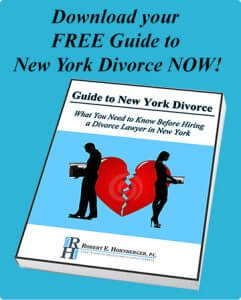 Our 41-page “Guide to New York Divorce: What You Need to Know Before Hiring a Divorce Lawyer in New York” written by an experienced Divorce Attorney Long Island’s Robert E. Hornberger, Esq., provides you with real information on the divorce process and the laws it rests upon in the state of New York. This book will help give you a solid foundation upon which you can begin the process of making your family’s, life better. Download your Free Guide to New York Divorce here.
Our 41-page “Guide to New York Divorce: What You Need to Know Before Hiring a Divorce Lawyer in New York” written by an experienced Divorce Attorney Long Island’s Robert E. Hornberger, Esq., provides you with real information on the divorce process and the laws it rests upon in the state of New York. This book will help give you a solid foundation upon which you can begin the process of making your family’s, life better. Download your Free Guide to New York Divorce here.
At your consultation, we will:
- Conduct a Comprehensive Review of your particular situation
- Provide a Full Explanation of the Legal Issues involved in your matter
- Discuss your Goals and Objectives
- Develop a Strategic Plan to Achieve your Goals
- Answer All of Your Questions & Concerns
- Provide Advice on collecting Key Documentation and Evidence to gather to achieve your desired outcome
Your attorney will describe the many options available to determine together the right solution for you. By the end of this conversation, we’ll all understand how we can best help you to move forward.
No Cost or Obligation
There is no cost or obligation for this initial consultation. It is simply an opportunity for us to get to know each other, answer your questions and learn if Hornberger Verbitsky, P.C. is right the right law firm for you. Give us a call at 631-923-1910 or fill in the short form below for your free consultation and case evaluation.
By submitting this webform, you consent to receiving periodic text messages from us. Message and data rates may apply. We assure you that your information will not be sold or provided to third parties. To opt out, reply 'Stop.' For assistance, reply 'Help.'
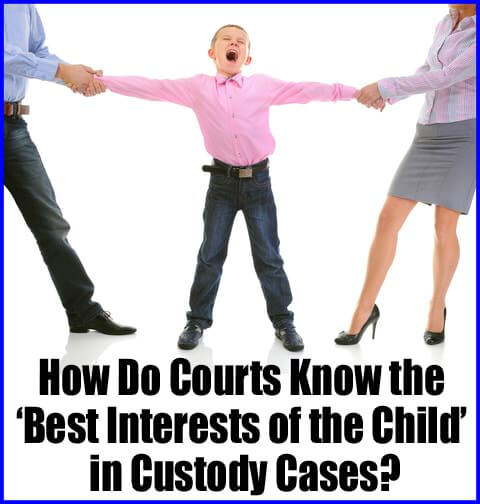
by Robert E. Hornberger, Esq | May 13, 2015
 As a Long Island Divorce Lawyer, I have been captivated by the sweeping headlines of the past five years, and especially throughout the last couple weeks, regarding the heart-wrenching story of a Colorado man who never gave up hope of seeing his two daughters again. The story begins around 2010, when the man, Dennis Burns, was granted residential custody of his two children after a heated legal battle with his soon to be ex-wife, Ana Alianelli. Shortly thereafter, Ms. Alianelli took the parties’ two children to her native Argentina against both Burn’s wishes and the Court Order which stated the children were to reside with their father. After approximately five long years, numerous trips to Argentina, multiple court appearances and appeals and countless sleepless nights, Mr. Burns was finally reunited with his children in April 2015.
As a Long Island Divorce Lawyer, I have been captivated by the sweeping headlines of the past five years, and especially throughout the last couple weeks, regarding the heart-wrenching story of a Colorado man who never gave up hope of seeing his two daughters again. The story begins around 2010, when the man, Dennis Burns, was granted residential custody of his two children after a heated legal battle with his soon to be ex-wife, Ana Alianelli. Shortly thereafter, Ms. Alianelli took the parties’ two children to her native Argentina against both Burn’s wishes and the Court Order which stated the children were to reside with their father. After approximately five long years, numerous trips to Argentina, multiple court appearances and appeals and countless sleepless nights, Mr. Burns was finally reunited with his children in April 2015.
Please keep in mind there are underlying international abduction and kidnapping issues at play in the Burns’ matter; however, putting those aside for a moment, I believe the case highlighted certain aspects of custody battles which are important to couples experiencing similar circumstances in Nassau County and Suffolk County during their Long Island Divorce. In reading articles and watching news programs about the Burns family, the phrase “best interests of the child” was continuously mentioned.
If you’ve read in prior posts on the subject of Child Custody on this Long Island Divorce Law website, you will know that the best interests of the child is the standard used by the Courts in Nassau and Suffolk counties, and all divorce courts in New York state, when making a child custody determination.
Pretend for a moment there are no international issues involved, the parties in this case both reside within the State of New York and Ms. Alianelli legally relocated with the children from Long Island to Buffalo. Five years later, Mr. Burns files with the Family Court seeking a modification of the current child custody order to declare him the residential parent and order Ms. Alianelli to return the children to Long Island. Not only would the court consider whether the potential relocation was in the best interests of the children, but it would also consider whether the potential change in custody was in the child’s best interests.
Taking facts from the Burns’ matter and simply replacing Argentina with Buffalo, the court would certainly consider the fact that while in Buffalo with the children Ms. Alianelli refused to allow Mr. Burns reasonable access to them. Although there was an existing Court Order which directed Ms. Alianelli to allow Mr. Burns to communicate with the children via Skype three times a week, Ms. Alianelli continuously and willfully violated this Order. It is the court’s strong opinion that it is in the best interests of the children to have two loving and caring parents. Naturally, the court looks unfavorably upon one parent if he or she alienates the children from the other parent.
Furthermore, Ms. Alianelli refused to allow the children to speak to their paternal grandparents while in Buffalo. However, upon the children’s return to Long Island, Mr. Burns seems more than willing to facilitate their relationship with their mother, even permitting their mother to travel from Buffalo to Long Island with them and agreeing to allow their mother to enjoy supervised visitation with the children.
If you are seeking custody or a modification of custody you must demonstrate that you foster a relationship between not only the children and their other parent, but also between your children and the other parent’s family.
As stated, it is important to keep in mind there were underlying international issues at play in the Burns matter, however, the three factors previously mentioned play an extremely important role in your Long Island Divorce if there is a custody battle, or if you believe there is the potential for a custody battle. As much as you and your soon to be ex-spouse may not get along or cannot stand to be in the same room together, you cannot let that get in the way of the child or children’s relationship with their parents. If you truly seek to be the residential parent, you must facilitate and foster the relationship between your children and their other parent, as well as their relationship with the children and their extended family.
Questions About Child Custody and Visitation on Long Island?
To learn more about what you need to know about Child Custody on Long Island, visit this page on Child Custody or contact us at 631-923-1910 for a complimentary consultation.
Have Questions About Your Child Custody Case? Receive a Free Consultation from a Divorce Lawyer, Long Island’s Robert E. Hornberger, Esq.
If you have questions about your children’s custody or need more information about issues of Child Custody in Nassau County or Suffolk County on Long Island, you should immediately consult a local divorce lawyer. Long Island’s Robert E. Hornberger, Esq., PC’s compassionate and experienced divorce attorneys can help. Call us at 631-923-1910 for a complimentary, confidential consultation or fill out the short form on this page and we’ll get right back to you.
Download our Free New York Divorce Guide
 Our 41-page “Guide to New York Divorce: What You Need to Know Before Hiring a Divorce Lawyer in New York” written by an experienced Divorce Attorney Long Island’s Robert E. Hornberger, Esq., provides you with real information on the divorce process and the laws it rests upon in the state of New York. This book will help give you a solid foundation upon which you can begin the process of making your family’s, life better. Download your Free Guide to New York Divorce here.
Our 41-page “Guide to New York Divorce: What You Need to Know Before Hiring a Divorce Lawyer in New York” written by an experienced Divorce Attorney Long Island’s Robert E. Hornberger, Esq., provides you with real information on the divorce process and the laws it rests upon in the state of New York. This book will help give you a solid foundation upon which you can begin the process of making your family’s, life better. Download your Free Guide to New York Divorce here.

by Robert E. Hornberger, Esq | Apr 21, 2015
 I have seen in my 15 years of experience as a divorce attorney, Long Island divorce cases often involve what are known as 4-Way Settlement Conferences among divorcing couples and their attorneys.
I have seen in my 15 years of experience as a divorce attorney, Long Island divorce cases often involve what are known as 4-Way Settlement Conferences among divorcing couples and their attorneys.
If you are considering retaining a Long Island divorce lawyer, you may have heard the term “4-Way Settlement Conference.” You are likely wondering what exactly this is and what role it plays in your divorce. While the term sounds scary, it is an extremely useful tool your attorney has in his or her pocket that will help keep you and your spouse out of litigation and away from the courts if done correctly. Therefore, the following are a few useful tips and suggestions to be aware of before sitting down for your first 4-Way Settlement Conference.
- Discuss Your Wants with Your Divorce Attorney Beforehand: the purpose of a 4-Way Settlement Conference is exactly that: a settlement. As I am sure your Long Island divorce attorney will advise you, “a good settlement is reached when neither party is happy”; that means that neither you nor your spouse received everything requested. Your divorce attorney is going to need to be aware of those items which are most valuable to you, whether they be child support, spousal maintenance or continuing to reside in the marital residence, so he or she can use other items as bargaining chips to get you closest to an ideal settlement.
- Be Prepared to Speak up If Necessary: as the client, you play an important role at a 4-Way Settlement Conference. In my 15 years of experience I have been party to settlement conferences where the attorneys took the lead and the client’s simply listened. However, I have also been party to settlement conferences where the clients did most, if not all, of the talking and negotiating between themselves. The attorneys were simply there to act as referees and advise their clients. We can never know which way a settlement conference will go beforehand. Therefore, make sure you are prepared to voice your opinions in the event your settlement conference becomes more “hands-on.”
- Listen and Respect the Desires of Your Spouse: I understand that you may find it particularly hard to care what your spouse wants right now. However, a 4-Way Settlement Conference will only be successful if you are both respectful of the other’s thoughts, feelings and desires. These conferences are collaborative in nature and if you enter the room ready to jump down your spouse’s throat it will be a waste of time.
- Your Attorney Is Advocating For You: prior to entering a settlement conference I tell my clients that they will inevitably walk away feeling as though I did not fight for their interests. This is natural. These conferences are not the time for your divorce attorney and your spouse’s divorce attorney to engage in a contest to determine who is better at their job. If you want your attorney to do this, a settlement conference will not prove fruitful. These conferences are a time to gauge your desires and your spouse’s desires so you both know where the other stands.
- Be Open to New and Different Ideas: your spouse’s attorney may suggest solutions to issues their neither you nor your attorney thought of. Rather than automatically rejecting these ideas simply because they came from your spouse or their divorce attorney, Long Islanders are encouraged to consider them. They may have the potential to solve problems while keeping everyone happy.
- You Will Walk Away Realizing How Close You Really are: many couples focus only on the big ticket items when going through their Nassau County or Suffolk County divorce – the children and the marital residence. However, a settlement conference will allow you to see that other issues, such as automobiles, joint banking accounts, retirement benefits or even the family pet are agreed upon. Knowing only two or three issues remain can alleviate a large amount of the stress involved in the divorce process.
A number of my clients are reluctant to agree to a 4-Way Settlement Conference with their spouse and their spouse’s divorce attorney. However, in my 15 years of experience I have found these conferences extremely useful. If the first conference is successful, we will likely schedule another to iron out any remaining issues. Before you know it, your Long Island Divorce will be settled without you ever having to step foot in a Nassau County or Suffolk County, Long Island Divorce courtroom.
Long Island residents who need more information about 4-Way Settlement Conferences should consult a local divorce attorney. Long Island’s Robert E. Hornberger, Esq., PC’s compassionate and experienced divorce attorneys can help you prepare you and ensure you, and your family’s future is protected. Call us today at 631-923-1910 for a complimentary, confidential consultation or fill out the short form on this page and we’ll get right back to you.
Our 41-page “Guide to New York Divorce: What You Need to Know Before Hiring a Divorce Lawyer in New York” written by an experienced Divorce Attorney Long Island’s Robert E. Hornberger, Esq., provides you with real information on the divorce process and the laws it rests upon in the state of New York. This book will help give you a solid foundation upon which you can begin the process of making your family’s, life better. Download your Free Guide to New York Divorce here.

by Robert E. Hornberger, Esq | Apr 14, 2015
 As a divorce attorney on Long Island, I’ve noticed that it’s rare to find a person in today’s society who does not have an account with Facebook, Twitter or Instagram. In the last 10 years especially, social media has become a large part of our lives. Since attending a seminar on electronic discovery in matrimonial proceedings, I thought it was time to remind you of the potential ramifications your social media behavior on your divorce in Nassau County or Suffolk County. As you have likely heard, once you post something on the Internet, you can never get it back and your posts can be used against you in your divorce.
As a divorce attorney on Long Island, I’ve noticed that it’s rare to find a person in today’s society who does not have an account with Facebook, Twitter or Instagram. In the last 10 years especially, social media has become a large part of our lives. Since attending a seminar on electronic discovery in matrimonial proceedings, I thought it was time to remind you of the potential ramifications your social media behavior on your divorce in Nassau County or Suffolk County. As you have likely heard, once you post something on the Internet, you can never get it back and your posts can be used against you in your divorce.
No Expectation of Privacy on Social Media
Because social media sites are public forums, you have little to no expectation of privacy concerning the pictures, statuses, comments or anything else you post on them. That girls’ weekend in Miami or hunting trip in Pennsylvania your friends posted photos of? Your spouse or his or her divorce attorney will see those. While you might not think these posts will have any effect on your case, you could be very wrong, especially in cases where there are tensions involving child support and/or spousal maintenance.
Think about this – your spouse continuously cries poverty and asserts he or she does not have the funds to pay the requisite amount of child support and the financial burden of supporting your children has fallen completely on your shoulders. A few weeks later while online you stumble upon pictures of your spouse driving a brand new BMW or standing outside a beautiful beach house in the Hamptons. How would you feel? Your spouse cannot afford to pay child support but they can afford these luxuries? You are completely mistaken if you think these pictures will not be used as evidence against him or her in your divorce proceeding. Your divorce attorney has a useful tool known as the subpoena in his or her pocket, which will allow the attorney to request records from a third party, including financial documents. And this goes both ways. Be careful what you post online because it can be used against you.
Emails Aren’t As Private As You Think
As a divorce attorney, Long Island’s Robert E. Hornberger, Esq. knows the most important point made at the seminar concerned the use of e-mail to communicate with your attorney. Communications between attorneys and clients that relate to the representation are privileged, but only if the information is communicated outside the presence of strangers. Before e-mail, it was simple to determine if communication was taking place outside the presence of strangers, however it has become a bit more complicated. “Snail mail”, as it has come to be known, is now rarely the sole form of communication used between two people. In fact, most of my clients request I communicate with them via e-mail about important matters.
While email is quicker, what people often do not realize, and what I feel it is my job to point out, are the privacy issues involved. First, you should never use an employer-provided e-email address to communicate with your Long Island divorce attorney, even if you are self-employed. Because your employer, and generally other employees, can access these accounts and servers, it creates the potential risk of losing the attorney/client privilege.
Additionally, do not e-mail your Divorce Attorney from a computer, iPad, or smartphone you share with your spouse or anyone else. If your child plays with the device, make sure it is necessary to enter a separate password before you can access your e-mail on the device. When creating a password, do not use the same word or combination you used during the course of your marriage as this would be easy for your spouse to figure out.
Don’t Let ‘The Cloud’ Rain on Your Parade
Online computer back-up software has become an important part of many people’s lives. Even though most of us don’t understand exactly what “the cloud” is, it has become ingrained in our lives as a way to protect our important files, be they documents, photographs, video or music. With your files backed up to “the cloud”, you no longer need to worry about external hard-drives or transferring all your pictures to a CD-ROM. However, this issue of online backup presents a great concern for Nassau County and Suffolk County divorce attorneys. If your device is hooked up to this type of server, everything — including your emails — may be transferred to it. Other devices connected to your WiFi account may also be able to access the server, in turn gaining access to your otherwise private communications.
As a Divorce Attorney, Long Island’s Robert E. Hornberger Esq. emphasizes that the most valuable advice I can give you regarding your divorce and the Internet is simply “do not do it”. If you need to communicate with your divorce attorney via e-mail, do so from a secure, private account. And remember, nothing on the Internet is every really deleted. Once it’s “out there”, it exists somewhere, even if you delete it.
Have Questions About the Internet & Your Divorce? Your Long Island Divorce Attorney Can Help
Are you concerned about things you may have posted online and how they might affect your divorce? Or, have you seen something your spouse posted and you wonder if it could help your case? The experienced and compassionate divorce attorney, Long Island’s Robert E. Hornberger, Esq., PC can help. Give us a call at 631-923-1910. We’ll do our best to ensure you’re legally protected during your divorce and set you up for the best possible future going forward.
Our 41-page “Guide to New York Divorce: What You Need to Know Before Hiring a Divorce Lawyer in New York” written by an experienced Divorce Attorney Long Island’s Robert E. Hornberger, Esq. provides you with real information on the divorce process and the laws it rests upon in the state of New York. This book will help give you a solid foundation upon which you can begin the process of making your family’s, life better. Download your Free Guide to New York Divorce here.
by Robert E. Hornberger, Esq | Apr 7, 2015
 As a divorce attorney on Long Island, I’m very familiar with the saying “Hindsight is 20-20,” or even the term “Monday morning quarterback.” Both of these phrases cause us to look back on our actions and wish we acted differently. Your Nassau County or Suffolk County divorce is no different.
As a divorce attorney on Long Island, I’m very familiar with the saying “Hindsight is 20-20,” or even the term “Monday morning quarterback.” Both of these phrases cause us to look back on our actions and wish we acted differently. Your Nassau County or Suffolk County divorce is no different.
As I meet with clients seeking the counsel of a divorce attorney on Long Island, it is not uncommon for them to express anger toward themselves at signs they “should” have seen which indicated their spouse may want a divorce. But it is easy to tell yourself you “should” have done or said something differently when you are not in the midst of the situation. At times people do not know their spouse’s odd behavior is a “sign” he or she may want a divorce.
I have compiled a list of the most common signs my Long Island divorce clients feel they missed, so you can determine if any of these exist in your relationship.
- You cannot seem to do anything right in the eyes of your spouse.
Your spouse asks you to do A so you do A, then he or she is angry that you did not do B, so you do B, and he or she says why did you not just do A. Does this situation sound familiar? It could be mowing the lawn, emptying the dishwasher, doing the laundry or cleaning the bathroom, but lately it seems that any task your spouse asks you to do is done incorrectly. As a human being it is natural to feel that the fault is on you, but you must consider that this may not be the case. Constant unhappiness and your spouse picking arguments is a tell-tale sign that he or she is unhappy in the relationship. Rather than feel as though there is something “wrong” with you, you should call your spouse’s behavior to his or her attention and discover their reaction. This could be the start of a conversation that leads to repair of your relationship, or, alternatively, provide a signal that it may be irreparable.
- Your spouse desires elective, cosmetic procedures that are otherwise out of character.
Does your wife all of a sudden want breast implants? Or does your husband come home from work and tell you he is going to get hair plugs? You think your spouse is attractive just the way they are, and they never seemed to have a problem with their body before. These are signs that your spouse’s self-esteem is low, and he or she may be seeking a confidence boost elsewhere.
- Little to no physical contact.
Your spouse was at one time affectionate and warm, but now he or she has become distant. There is never a hand on your knee or an arm around your waist. Affection is necessary in a marriage, and the lack of it, if it was once present, could be cause for concern.
- You have “uncoupled”.
While it can be healthy to have interests outside the marriage, most married couples spend most, if not all, of their free time together. They partake in activities that are of interest to both of them, or one agrees to partake in an activity he or she knows their spouse thoroughly enjoys. It is also not uncommon for the social circle of a married couple to consist solely of other married couples. Notice if your spouse becomes interested in a new activity and does not include you, or if your spouse begins to spend time with your social circle without you. It may be something as simple as your spouse saying “I met Jack and Jill for a drink after work; it was no big deal.” And once is no big deal, however, if this behavior becomes consistent it should be a red flag.
- There is little to no compromise in your relationship.
It has become “my way or the highway” with your spouse lately. A marriage consists of two people, and as such, the needs and wants of both should play a role in any decision making. At times this calls for compromise. If you notice that your spouse is doing only what he or she wants to do with no care for your emotions or desires do not be left in the dark. Discuss this issue with your spouse, and if there is no positive feedback, start thinking about the best route for yourself.
- Communication between you and your spouse has hit an all-time low.
Communication is the most important part of any relationship. Any of the above mentioned concerns in your marriage have the potential to be solved if you are able to communicate in a mature manner with your spouse. If you are unable to do so, this may be the most blaring sign that your relationship is in trouble. Without proper communication, both or one of you may begin to feel as though the other does not care and this knowledge will likely drive a wedge between you.
Marriage is a Delicate Relationship that Takes 2 to Work
As a divorce attorney on Long Island, I have seen first-hand that a marriage is a delicate relationship that requires work from both people involved. If you are alone in trying to make your marriage work, it is unlikely you will be successful. If it feels like you are banging your head against a wall trying to make your marriage work and your partner refuses to try at all, it may be time to begin thinking about your own well-being and your future health and happiness and less about the fighting to repair a marriage where your spouse has already “checked out”.
Ready to Move On? Receive a Free Consultation from a Divorce Attorney
For more information about divorce on Long Island, visit this page: Divorce Lawyers Answer Questions about Long Island Divorce. Long Islanders who have been unhappy in their marriages for a long time should consult a divorce attorney. Long Island’s Robert E. Hornberger, Esq., PC’s compassionate and experienced divorce attorneys can help you prepare for the inevitable and ensure you, and your family’s future is protected. Call us today at 631-923-1910 for a complimentary, confidential consultation or fill out the short form on this page and we’ll get right back to you.
Our 41-page “Guide to New York Divorce: What You Need to Know Before Hiring a Divorce Lawyer in New York” written by an experienced Divorce Attorney Long Island’s Robert E. Hornberger, Esq. provides you with real information on the divorce process and the laws it rests upon in the state of New York. This book will help give you a solid foundation upon which you can begin the process of making your family’s, life better. Download your Free Guide to New York Divorce here.
by Robert E. Hornberger, Esq | Mar 31, 2015
 As a Long Island divorce lawyer, my assistance is often sought to submit to the court a name change request on behalf of their minor children Nassau County or Suffolk County court. I have found that the general consensus regarding name changes in New York is that the process is quite easy. However, the reality of the situation is quite opposite.
As a Long Island divorce lawyer, my assistance is often sought to submit to the court a name change request on behalf of their minor children Nassau County or Suffolk County court. I have found that the general consensus regarding name changes in New York is that the process is quite easy. However, the reality of the situation is quite opposite.
Procedural Requirements for a Name Change in Suffolk County or Nassau County Court
In order to file a name change request, you must first download and fill out the appropriate forms from the New York State Unified Court System website. If you wish to do this on your own you must be careful, as there are different forms for “state” residents as opposed to “city” residents. Because my divorce attorney firm practices mainly in Nassau County and Suffolk County, this blog will discuss only how to file for a name change in those counties. After completing the requisite forms, you will need to file them with the court. There is a $210 filing fee in Supreme Court, as well as any additional fee associated with filing a Request for Judicial Intervention. A Request for Judicial Intervention is a necessary form that alerts the court to your request in order to have a judge assigned to the matter.
The Petition for an Individual’s Name Change requests information such as whether the minor (or individual seeking a name change) has ever been convicted of a crime, has ever filed for bankruptcy, or if there are any judgments or liens against the child or any property titled to the child. This information is requested because if the judge believes you are seeking to change your child’s name to commit fraud or otherwise avoid debts, liabilities and/or other responsibilities, it is likely your request will be denied.
What Do I Have to Show in Suffolk County or Nassau County Court for My Petition to Be Granted?
The recent Suffolk County case Matter of Dennington (Schaeffer), 2014 NY Slip Op 51735 (U)(2014), analyzed what may and may not be a valid reason to grant a name change petition.
The Petitioner, who alleged the child’s father was absent from the child’s life, sought to change the child’s last name to her own maiden name. After hearing conflicting testimony about the father’s role in the child’s life, the Court noted that deciding a name change petition must be done after an examination of the totality of the circumstances, and whether based upon those circumstances, granting the petition would be in the best interests of the child involved. Therefore, such a decision is not based solely upon the word of the moving party. Rather, the court will consider, among other things, whether changing the child’s surname would affect his or her relationship with either parent, how the child is known throughout the community, the extent to which the child identifies with his or her last name, and, if old enough, the child’s preference to have his or her named changed. Matter of Eberhardt, 83 A.D.3d 116, 123-24 (2d Dep’t 2011).
Additionally, even if a court finds a name change to be in the best interests of the child, there must still be a “compelling” reason to grant the name change, such as “where the natural father is guilty of misconduct, abandonment, or lack of support.” Matter of Dennington (Schaeffer), 2014 NY Slip Op 51735 (U)(2014). It is believed that unless one of the above is shown, such a decision is better left to the child when he or she reaches maturity. Id.
What if the Non-Custodial Parent is Delinquent in Child Support Payments?
What most likely caught your eye from the above decision is the statement that the lack of support may be a compelling reason to grant a name change application. However, it also must be known that while the Court in Dennington did note that the lack of support was a compelling reason, it also denied the Petitioner’s motion even though she alleged that the Respondent-Father was in arrears on child support and his wages were now being garnished. Therefore, it seems that there must be a gross lack of support for this to be sufficient grounds on which to base a name change application.
Your Long Island Divorce Lawyer Can Advise You Regarding Name Change Petitions in Suffolk County or Nassau County Court
Whether or not to file a name change petition on behalf of your minor child is a purely personal decision. As a Long Island divorce lawyer, I can only guide you as to the laws involved and the likely outcomes. If you have doubts as to whether your petition would be granted, you may take either the “wait and see” approach, and allow the child to make his or her own decision upon reaching the age of 18, or the “I’ll never know unless I try” approach and file now. As always, it is important to remember that the child will be affected by any name change, and you must be sure you are seeking this for the right reasons.
When you’re ready to move forward, give the experienced and compassionate Long Island divorce lawyers at Robert E. Hornberger, Esq., PC a call at 631-923-1910. We’ll help walk you through the process so you can decide for yourself which route is in your, and your child’s, best interests.
by Robert E. Hornberger, Esq | Mar 24, 2015
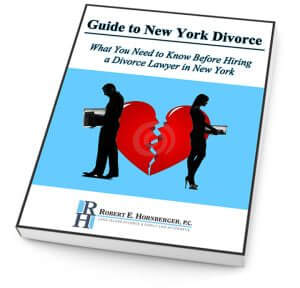 Long Island, NY divorce lawyer Robert E. Hornberger, Esq. is pleased to offer you a free copy of his brand new eBook written to help you navigate the often murky waters of divorce in New York State.
Long Island, NY divorce lawyer Robert E. Hornberger, Esq. is pleased to offer you a free copy of his brand new eBook written to help you navigate the often murky waters of divorce in New York State.
The eBook, “Guide to New York Divorce: What You Need to Know Before Hiring a Divorce Lawyer in New York” takes the mystery and fear out of the often the difficult process of divorce so you can make the best decisions for yourself and your family.
Rather than charge for what is truly a valuable resource for couples considering divorce, we’re making the guide available as a free download from this website. Just click this link, Free Guide to New York Divorce by Long Island Divorce Lawyer Robert E. Hornberger, Esq.
Why the ‘Guide to New York Divorce: What You Need to Know Before Hiring a Divorce Lawyer in New York’?
Speaking to your spouse about a divorce is not likely a conversation you imagined yourself having when you got married. But as we all find out sooner or later, we never know what life has in store for us. As a Long Island divorce attorney with 15 years of experience, I have seen husbands and wives enter my office with numerous emotions; complete disbelief, extreme anger, and at times, even joy.
However one thing that stays the same with the majority of the clients we encounter is that each one is anxious. Most people will go their entire lives without dealing with the court system, but a divorce puts you in the position to stand in front of the judge and discuss personal matters.
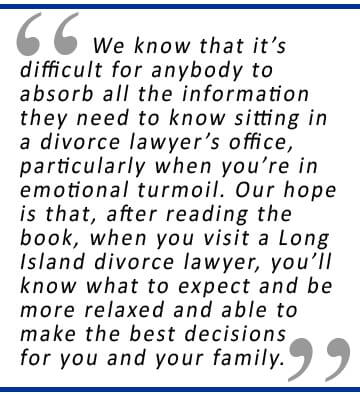 We know how complicated and scary this unknown process of divorce can be. Therefore, my job as a Long Island divorce attorney is not only to fight for the rights of my clients in court, but to also fight for them outside of court, and attempt to make a stressful process just a little less stressful.
We know how complicated and scary this unknown process of divorce can be. Therefore, my job as a Long Island divorce attorney is not only to fight for the rights of my clients in court, but to also fight for them outside of court, and attempt to make a stressful process just a little less stressful.
Our intent behind publishing this book is exactly that. We hope to provide you with some general information on the divorce process and the laws it rests upon in the State of New York, so you are better able to meet with divorce attorneys confidently, and begin your divorce prepared for the road that lies ahead.
We understand that if you’re considering a divorce on Long Island, you are likely distraught at the prospect of going through a divorce. Even if you are initiating the divorce, it’s still an emotional experience and there’s so much confusion and misinformation out there. We wrote this book to help people who may be considering divorce in New York understand what they’re getting into. We hope that by being able to read this book on your own time from the comfort and convenience of your own home, you’ll be better prepared for what’s to come when you take the step to meet with a Long Island divorce lawyer.
The eBook covers the most important issues anyone on Long Island considering divorce in New York will have to tackle. We’ve provided a glimpse of the Table of Contents of the eBook below to demonstrate the comprehensive nature of this guide. Far from a “sales pitch” for our firm, we want you to consider carefully what you’re getting into and be sure that you’ve tried everything to save your marriage before you initiate divorce proceedings. We also want to be sure that, should you decide to divorce, that you are prepared to move on with your life after your divorce in a healthy and happy way.
We know that it’s difficult for anybody to absorb all the information they need to know sitting in a divorce lawyer’s office, particularly when you’re in emotional turmoil. Our hope is that, after reading the book, when you visit a Long Island divorce lawyer, you’ll know what to expect and be more relaxed and able to make the best decisions for you and your family.
Download Long Island Divorce Lawyer, Robert E. Hornberger, Esq.’s New eBook Now
The new eBook, “Guide to New York Divorce: What You Need to Know Before Hiring a Divorce Lawyer in New York” is available now as a free download from the company’s website, https://divorce-longisland.com
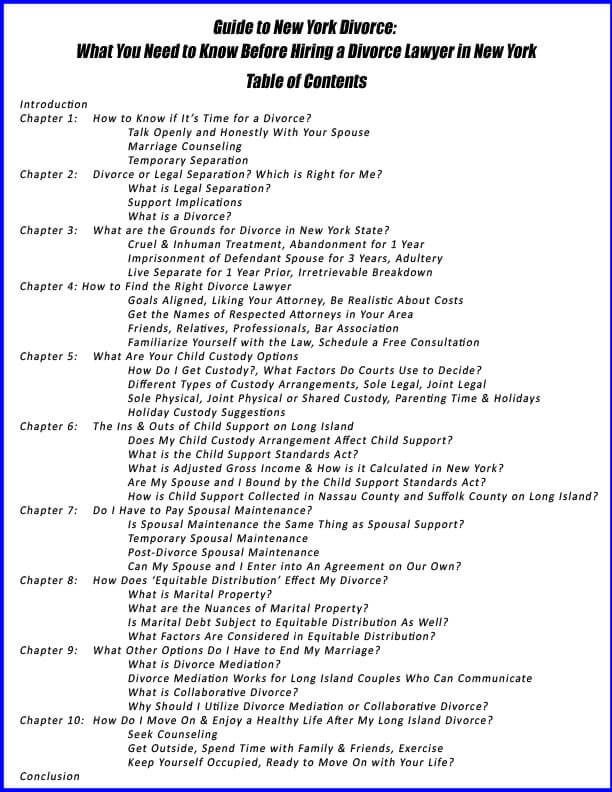
by Robert E. Hornberger, Esq | Jan 1, 2015

by Robert E. Hornberger, Esq | Nov 11, 2014
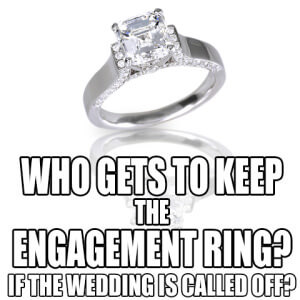 As a Divorce Lawyer on Long Island, one of the questions I hear when marriages are called off, or even result in divorce is, “Do I get to keep my engagement ring?” or “Can I get the engagement ring back?”
As a Divorce Lawyer on Long Island, one of the questions I hear when marriages are called off, or even result in divorce is, “Do I get to keep my engagement ring?” or “Can I get the engagement ring back?”
In most relationships, one partner spends a significant amount of money on an engagement ring on behalf of the other partner. A lot of “advice” on this topic suggests the proposer should spend two months’ salary on the engagement ring. Naturally, one would assume that the partner who purchased the ring was entitled to keep it or get it back if the engagement is called off, but that’s not always the case. Who gets to keep the ring is solely centered upon whether that ring was a straightforward gift from one partner to the other, or if the ring was solely a gift in contemplation of marriage. In any case, once the marriage occurs, the engagement ring is usually considered to be the property of the recipient, unless the couple comes to some other agreement.
What is a Gift in Nassau County or Suffolk County Courts?
When you think of the word “gift” your mind likely jumps to special days like birthdays, anniversaries, etc. or holidays like Christmas, Hanukkah, Valentine’s Day, etc. due to the giving and/or receiving of beautifully wrapped presents. However, clothes or jewelry do not require wrapping paper to be considered a gift. So long as the giver has the intent to give a gift, the same is delivered to the recipient, and the recipient accepts it, a gift has been made. Upon the satisfaction of the above three requirements, the gift becomes irrevocable.
So, Does the Recipient Always Get to Keep the Engagement Ring?
If the parties never marry, the answer in Suffolk County and Nassau County courts on Long Island is an emphatic “no”. Most states, including New York, require the recipient to return the engagement ring to the giver because the ring is classified as a conditional gift. The condition placed upon the gift, naturally, is the marriage of the parties. If the condition is not satisfied and the marriage is called off, the engagement ring must be returned to the giver, regardless of whose fault the broken engagement is.
The recent Nassau County case of Torres v. Lopez demonstrates this point
The Defendant testified as follows: Although there was no marriage proposal, the Plaintiff had given the Defendant a diamond ring in April of 2010, after at least six years of dating and referring to each other as “spouses”. The Plaintiff’s reasons for purchasing this ring were to show his appreciation to the Defendant for being a good mother. However, the Defendant contributed $4,500 of her own funds toward the purchase of such. Additionally, when asked by friends and family if the ring was an engagement ring, the Defendant always stated that she was not sure yet because the Plaintiff had never asked her to marry him. Sometime in October of 2011 the Plaintiff and Defendant parted ways, and the Defendant eventually moved out of the parties’ shared apartment.
The Plaintiff’s testimony: The Plaintiff testified that the ring was an engagement ring, and therefore he was entitled to its return. According to the Plaintiff, the Defendant did not contribute funds to its purchase price, the two referred to each other as “fiancée”, the Defendant’s family had already begun planning an engagement party for the couple, and the couple had looked at wedding venues. However, upon the relationship’s demise, the Defendant refused to give the Plaintiff the ring back.
Weighing the testimony of both parties against the other, the Court found the Defendant’s testimony to be more credible. While the factual issues presented were close, the Plaintiff had the burden to establish by a preponderance of the evidence that the ring was given to the Defendant in contemplation of marriage. Because he called no other witnesses, submitted no bank records, no receipts stating that the ring was an engagement ring, or anything else evidencing the fact this was not an unconditional gift, the Court held that Plaintiff was entitled to keep the ring.
What Does This Mean For Me?
Therefore, while it seems the outcome of these situations may be highly fact-specific, it is important to note that if it is not clear whether or not the ring was an “engagement ring” given upon the condition that the parties would marry, the recipient may be entitled to retain its possession. If you are thinking of a marriage proposal, you may even wish to ensure the invoice or receipt states that the ring is in fact an engagement ring. As always, it is important to discuss the specifics of your case with your Long Island Divorce Attorney.
Distribution of Property in Divorce Questions?
Compassionate Long Island Divorce Attorney Has Answers
The experienced and compassionate divorce attorneys at Robert E. Hornberger, Esq. P.C. have helped hundreds of Long Island couples resolved their divorce and legal separation issues amicably and affordably. Contact us today at 631-923-1910 to schedule your free, no-obligation consultation with an experienced Long Island divorce attorney.
by Robert E. Hornberger, Esq | Oct 28, 2014
 Can I Start an Action for Divorce if I Cannot Locate My Spouse?
Can I Start an Action for Divorce if I Cannot Locate My Spouse?
When you think of a divorce on Long Island you may immediately think of a couple living apart for years, or a spouse slamming the front door on the way out never to be seen or heard from again. However, many couples about to go through a Divorce on Long Island still reside with one another in the marital residence. If couples do not reside together, the majority are at least aware of where the other lives. You may be surprised to learn that some couples actually have no idea where their spouse is. While you may be thinking “so what?” this can pose a problem for the spouse attempting to file for divorce, as the defendant spouse must be served with the divorce papers.
Service of Process in a Long Island Divorce Proceeding
After completing the necessary paperwork with your Long Island Divorce Attorney, one of the first steps to begin an action for divorce is service of the divorce papers upon the defendant spouse. The manner in which these papers can be served is governed by New York’s Civil Practice Law and Rules, and includes four different methods. The permissible methods are as follows:
- Personal service upon the defendant spouse him/herself
- Service upon a person of suitable age or discretion residing in the defendant spouse’s dwelling place or usual place of abode
- Affix and mail service, which includes affixing a copy of the summons to the defendant spouse’s actual place of business, dwelling place, or usual place of abode, as well as mailing a copy of the same to one of the above mentioned addresses
- Although not applicable in matrimonial actions without prior court approval, service may also be made upon an agent of the defendant spouse within the state.
Are There Alternative Methods of Service for Long Islanders?
In certain instances the above methods of service may prove to be unfeasible. In such cases the court has the discretion to order an alternative method of service. However, the court cannot order an alternative method of service on its own accord; rather, the party attempting to effectuate service must file a motion showing that service by the statutorily permitted methods is impracticable.
What Must be Shown to Establish Impracticability on Long Island?
New York’s Second Department has stated that impracticability does not require the moving party to show that “actual prior attempts to serve a party under each and every method provided in the statute have been undertaken.” State Street Bank and Trust Co. v. Coakley, 16 A.D.3d 403, 403 (2d Dep’t 2005). Rather, the only showing that must be made in the moving papers is one that, when supported by facts, tends to prove that service by a statutorily permitted method would be futile. Saulo v. Nuomi, 119 A.D.2d 657, 658 (2d Dep’t 1986).
What Does This Mean for My Long Island Divorce?
You should make every attempt possible to locate the whereabouts of your spouse before filing an order for alternative service with the court. While your Long Island Divorce Attorney is in the position to best advise you on what steps to take, the following are a few suggestions of agencies which you may consider contacting in an effort to obtain your spouse’s address:
- The Post Office: conduct a post office search for your spouse’s last known address(es). You may get lucky and find he or she left a forwarding address.
- The New York State Department of Motor Vehicles: if your spouse has a driver’s license and notified the DMV of his or her relocation, it will have an updated address on file.
- The County Board of Elections: if your spouse is registered to vote, the county in which he or she is registered will have an updated address on file.
Additionally, the internet can be an extremely useful resource for locating individuals. The majority of people are not even aware that their personal information, such as their address, is accessible with a simple Google search. Therefore, there are a variety of avenues which need to be exhausted before it is likely a court will consider an order for alternative service. As always, be sure to discuss the specific facts and circumstances of your case with your Long Island Divorce Attorney.
Need Help? Long Island Divorce Attorneys are Here for You
If you need help locating your spouse to file your Long Island Divorce papers, the compassionate and experienced Long Island Divorce Attorneys at Robert E. Hornberger, Esq., PC are here to help. Contact us today at 631-923-1910 for a free consultation or fill out the short form on this page and we’ll get right back to you.
For more information about Divorce on Long Island, visit this page: Divorce Lawyers Answer Questions about Long Island Divorce

 Our 41-page “Guide to New York Divorce: What You Need to Know Before Hiring a Divorce Lawyer in New York” written by an experienced Divorce Attorney Long Island’s Robert E. Hornberger, Esq., provides you with real information on the divorce process and the laws it rests upon in the state of New York. This book will help give you a solid foundation upon which you can begin the process of making your family’s, life better. Download your Free Guide to New York Divorce here.
Our 41-page “Guide to New York Divorce: What You Need to Know Before Hiring a Divorce Lawyer in New York” written by an experienced Divorce Attorney Long Island’s Robert E. Hornberger, Esq., provides you with real information on the divorce process and the laws it rests upon in the state of New York. This book will help give you a solid foundation upon which you can begin the process of making your family’s, life better. Download your Free Guide to New York Divorce here.





 As a divorce attorney on Long Island, I’m very familiar with the saying “Hindsight is 20-20,” or even the term “Monday morning quarterback.” Both of these phrases cause us to look back on our actions and wish we acted differently. Your Nassau County or Suffolk County divorce is no different.
As a divorce attorney on Long Island, I’m very familiar with the saying “Hindsight is 20-20,” or even the term “Monday morning quarterback.” Both of these phrases cause us to look back on our actions and wish we acted differently. Your Nassau County or Suffolk County divorce is no different. As a
As a 
 We know how complicated and scary this unknown process of divorce can be. Therefore, my job as a Long Island divorce attorney is not only to fight for the rights of my clients in court, but to also fight for them outside of court, and attempt to make a stressful process just a little less stressful.
We know how complicated and scary this unknown process of divorce can be. Therefore, my job as a Long Island divorce attorney is not only to fight for the rights of my clients in court, but to also fight for them outside of court, and attempt to make a stressful process just a little less stressful.














